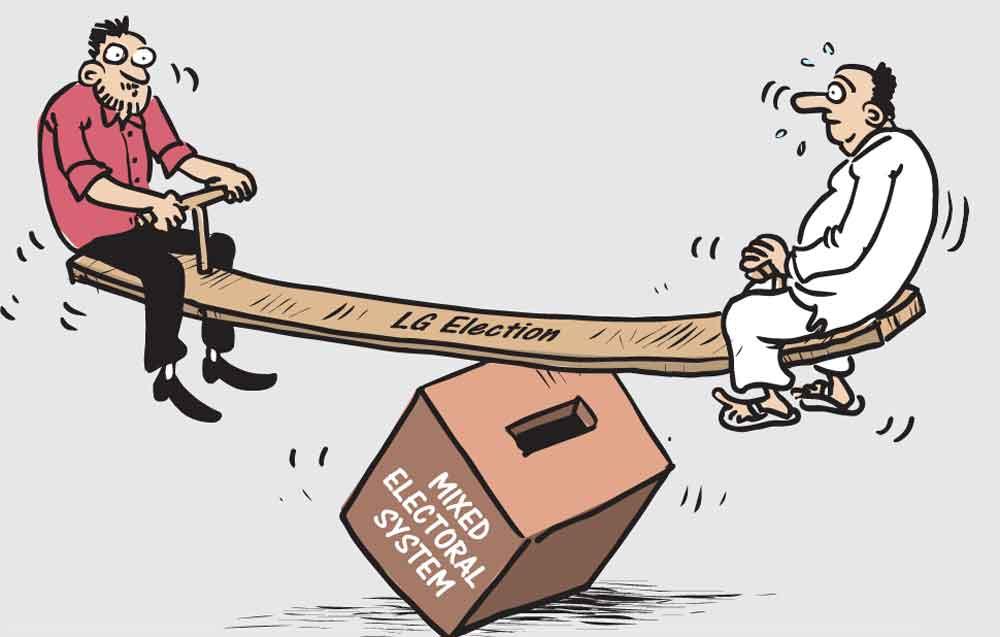29 Oct 2024 - {{hitsCtrl.values.hits}}

The results of Saturday’s Elpitiya Pradeshiya Sabha election cannot be taken as an indication of the results of the forthcoming Parliamentary election scheduled for November 14, as some suggest, since the two elections are different in several aspects.
Main among the differences is the election in Elpitiya was held under the mixed electoral system – a system that combines the First-Past-the Post (FPP) and the Proportional Representation (PR) systems – whereas the Parliamentary election is going to be held under the PR system. And unlike the PR system that is in Sri Lanka, the mixed electoral system applied to the local government bodies in the country lacks some of the safeguards against instability of the relevant councils.
For instance, the results of the Elpitiya Pradeshiya Sabha election have brought about a ruling party and an Opposition with equal number of seats (15). This might create chaotic situations during the course of the council meetings, unless the NPP team which bagged the highest number of seats in the Pradeshiya Sabha managed to garner support of some other group/groups that has/have won seats. On the other hand, the party that polls highest number of votes in a district at a general election under the existing PR system would be awarded an additional seat which is generally called the “bonus seat.”
Had the people voted at the general election in the same manner as they did at the September 21 Presidential election, the NPP would have obtained 15 bonus seats from the 15 districts where it topped. Similarly, had the Elpitiya Pradeshiya Sabha election been held under the PR system that is applied in the general election, the NPP would have got 16 seats including a bonus seat and the collective strength of all other parties would only be 14 seats. And if the 5 percent cut-off point had also been applied, four parties including the party that was formed on the eve of the Presidential election under the leadership of former Prime Minister Dinesh Gunawardene would have been eliminated from seat sharing.
Apart from the electoral system under which the Elpitiya PS election was held, the enthusiasm in that election was very low compared to what it would be at the upcoming Parliamentary election. Only 63 percent of registered voters had shown interest in casting their ballot on Saturday.
However, the Elpitiya election reminds us the chaotic situation that prevailed in many local councils subsequent to the last local government elections held on February 10, 2018, due to the Opposition in those councils had won equal number of or more seats than the parties that won the highest number of seats in them. Thus, it was after several weeks of haggling, discussions and horse-trading that the chairmen and deputy chairmen were appointed to those councils.
The mixed electoral system was introduced in 2012, first for the local government bodies and it was tested on the ground in 2018. The mess following the elections was such then that even Mahinda Rajapaksa, the leader of the Sri Lanka Podujana Peramuna (SLPP) that won 239 out of 340 councils for which the elections were held called on the authorities to bring in amendments to the electoral system. Many other people including the then Chairman of the Election Commission Mahinda Deshapriya also pointed out the need to revise the system.
As in many issues, Sri Lankan leaders and other politicians forgot the problem later and many other issues also eclipsed the matter. Former President Ranil Wickremesinghe wanted to amend the Local Government Elections Act at the tail end of 2022, observing that number of members of local government bodies must be reduced. Yet, Opposition parties blamed that what in fact he intended to do was to postpone the local government election that was scheduled to be held in March, 2023, for fear of defeat. Interestingly, once the elections were postponed through refusing funds, he no longer seemed to be interested in amending the said law.
The Supreme Court on August 22 ruled that the postponement of local government elections has infringed the fundamental rights of the people and ordered those elections be conducted as soon as possible. Accordingly, the Election Commission has stated that those elections would be held immediately after the general election. That means a messy situation has to be expected in many local councils again since the government does not have time to make amends.
22 Dec 2024 24 minute ago
22 Dec 2024 37 minute ago
22 Dec 2024 3 hours ago
22 Dec 2024 3 hours ago
21 Dec 2024 21 Dec 2024